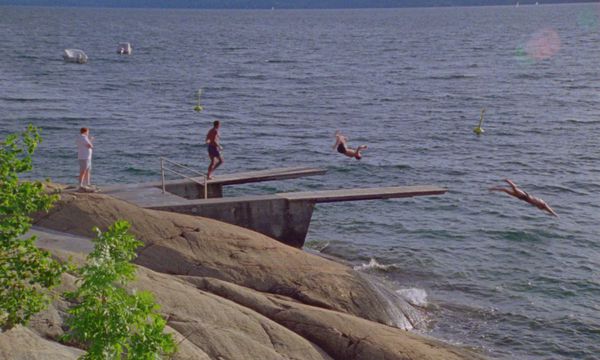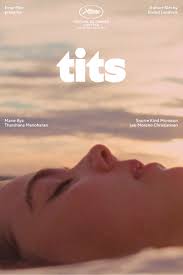 |
| Tits |
Eivind Landsvik is still coming to terms with being a person of importance in filmmaking. He was blown away when his short film Tits was selected by the Cannes Film Festival, and when I met him a week after the screening he was still surprised to hear that I had been impressed by it and that was the reason I wanted to interview him. It’s a small scale, intimate tale about teenage life in Norway, but it’s one a lot of of people can relate to.
The story focuses on Oscar, a shy boy who feels uncomfortable about his body, and especially the appearance of his chest, putting on two t-shirts before he goes out to the beach to join his friends. There’s a girl there, Iben, whose casual remark will seriously dent his confidence, but after she falls victim to a misogynistic prank, the two find that they have more in common than they thought.
“I think the idea somehow started with him,” Eivind says, “and the idea of having this young boy getting ready for a night out with his friends, and how a tiny comment can potentially ruin your evening. I wanted to tell a story about a boy who is behind on a lot of things. He is intellectually way in front of all the others, but it's something that doesn’t give him any social status. He is insecure about his body. At the same time, he has confidence in who he is, and his moral compass. So instead of trying to fit in and be like the other boys end up being, he doesn't think that the girl who shames him in the beginning is mean. He understands that she under the same pressure. And so yeah, I wanted to tell a story about a fragile boy. Very often they are portrayed as like incel characters, but he's not like that.”
 |
| Marie Bya in Tits |
Oscar and Iben are both quite fragile characters in their different ways. How did he find the right actors, given that it takes a lot of courage for young people to play roles like that?
“Really.” He nods. “It was difficult casting process, because before thinking of this as an international film, which it has become a little bit, I was thinking of it in terms of Norway. So I wanted to use actors that weren't so famous from other things, because I felt that that would give the story the honesty and realness I think it needed. And so the casting director [Hannah Chocron Foldøy] and me, we spent a lot of time talking about how we would go forward, just with the casting call for Oscar. It's difficult to ask directly for an actor with a specific body type, but I think we did it in a very discreet and polite way.
“To start with Oscar, Snorre [Kind Monsson] who plays him was one of the first suggestions that Hannah, my casting director showed me. I don't remember but I've been told by her that I was like, ‘No, he is not right,’ or something like that, at the time. When we didn't find him, someone else at the office said ‘Hey, what about this guy?’ and showed me his Instagram page. He had all these funny videos, because he's an up and coming comedian in Norway. And I called her and said ‘What about this guy?’ And she said ‘Yeah, that was one of the first names I mentioned.’” He laughs.
“We sent him the script. He was just like, ‘Yeah, I love it, but I'm on vacation.’ So we had to do the audition over Zoom when he was at the beach in Spain with his friends. Even with that difficult setup, he just blew my mind in how sincere and talented he was. I was afraid that he couldn't do that because he was a comedian. I guess, as a comedian, you also need to know different types of human beings. He really understood the character and he got the role immediately.
“With Marie [Bya], who plays Iben, that was easier, because girls are more confident at that age, it seems, in my experience at least. They're less afraid to show feelings in front of the camera. And she made a self tape that was so negative, honestly, in a very specific teenager type of way where she started with a big sigh. Like, ‘This is my seventh try. I don't know why I do this, you're never going to pick me.’ And she was just complaining the whole time!” He smiles. “The energy she gave out was very similar to the way I had thought the character to be.
“She was not a trained actor, and we just tried to use what she had as a human being and work with that and try to develop the character together with her. She participated in the casting of the other boys, and that was because I thought she was going to get the role, and that gave her a lot of training. When she got the part she was so relieved. Yeah, but Snorre, he has a lot of experience as a kid actor. He was in theatre for years.”
I was impressed by the film because the teenagers do feel so real and so fresh, and that's in the dialogue as well. A lot of people really struggle to write believable dialogue for teenagers. How did he approach it?
 |
| Snorre Kind Monsson in Tits |
“I have worked a lot with teenagers in my earlier films, music videos and stuff like that, so I've listened in a lot to how they talk. But really, I wrote the whole film as I remembered things from my own teenage years. It's not a biographical film, but I just remembered how things worked. I thought that we would have to change a lot of stuff for this generation, but the feedback we got from them was just ‘This is how it is. How can you write the way we talk?’ And we got a lot of confidence from that. When we do readings, there's always some lines that sounded way better on paper than when people say them, and then I change with the actors, but I guess, 80% of it is the way it was written.”
We discuss a subplot in the film is which Jonas, the boy Iben is infatuated with, seems more interested in admiring his friend’s physique that in kissing her.
“To me, that’s part of the topic of toxic masculinity,” he says. “But also I think it's funny and cute in the way that these stereotype alpha male boys were so much into girls, they talk about that all the time, but sometimes nothing is more important than just the guys. And I think it's cute that he almost has a bigger crush on his male friend than the girl. And I think that is also because girls come easy to him. I think, for him, it's a bigger pressure being in that group of boys. It’s easier to hook up with a girl than keeping his status in this group of boys. That's where Oscar is different because he doesn't care too much about getting in with them.”
Talking about toxic masculinity, I note that the central incident in the film is something which I’ve often seen played as comedy elsewhere, where viewers are expected to identify with the boys.
“I have seen similar things happen,” he says sadly, explaining that he had a lot of female friends when he was growing up, so he saw both sides of that kind of incident. “I tried to tell that specific thing from her point of view, because she's so crazy about the boy who actually ends up being mean to her. And the boy she has been mean to is being nice to her. It's not about her learning a lesson, it's just it's so messy, and you don't know who to trust or who is your friend. The whole film is about the chaos of growing up.
“I was trying also to not be too judgmental, because I don't think the boys are necessarily mean or bad persons. They are young and stupid and do things without thinking. She survives this, but I wanted also to show how mean it is, and how it affected her as well. To me there's a deeper meaning in that she really thinks she deserved what happened to her, and I don't think that's true.”
I tell him that I like the way that the story unfolds over the course of the day, and the way the light changes towards the end, because it strikes me that when I was that age, it was always a bit later on, and after parties, after most of the fun was over, that there would be something which felt more real. Here, it feels as if we've progressed to that point where there are more possibilities, and it's easier to be honest and open.
He nods. “That was something that impressed me about Marie's acting as well, because she really has three different types of persona during those 12 minutes. She is one person with her best friend, and then she's a slightly different person with the boys she likes, and then she is a totally new person with Oscar because she's so vulnerable. And those are the moments that have always been the most meaningful to me. I'm always more comfortable in smaller crowds, and I that's what I wanted to happen with her as well. We had to film chronologically because of the light, which I think was good, because there were so many untrained actors.”
 |
| Tits poster |
I explain that I had been wanting to ask about the cinematography as well, because there's such good work in the film and it really enhances its overall quality.
“I agree,” he says.” Andreas [Bjørseth] is one of my best friends and the colleague in film that I've worked with the longest. We started out together making music videos, and we have a similar tastes and similar backgrounds. He was one of the first people that read the script and I knew that he would know exactly what to do. The last film we did together before this was more controlled, with the camera on the tripod, but here we could just be free and let the actors move more naturally, and we will follow on a handheld camera.”
We move on to the subject of Cannes.
“It's been my dream for as long as I’ve been making film,” he says, with a shy smile which suggests that he still can’t quite believe it’s all real. “It was really a special moment because we were gathering the tiny crew we have and the actors and I was going to show everyone the film for the first time. We had rented a theatre in Oslo to just show the people who were working on the film, the film for the first time, and only five minutes before I was walking over to the cinema to meet all the guy, I got a phone call from a French number. It was Cannes Film Festival. I was like ‘No! What are you saying?’ They were like, ‘Yeah, we're serious. You're going to Cannes.’
“The rest of that evening was just a mess, because I was so happy and nervous. I couldn't wrap my head around this because it was such a big thing. I don't see it as only this film. I see it as many years of work – and then it happened and I'm really grateful. Going to Cannes was an unforgettable experience. I have never been greeted better by a festival. They had a programme for several days. Meeting the other directors was really great. It's called Main Competition, but I felt like every director in that competition was just cheering each other on, and it was one of the best weeks I've ever had.
“It was really scary to show them the film, but I was very relieved when I heard people laughing. Even with subtitles, you know, you're always a bit afraid of something being lost in translation. And when I made the film, I made it very local and very specific to what I know from growing up in Norway, like all the teens go out to drink because obviously, they can't do it at home. This was a big part of my teenage years, but I guess this is common in a lot of countries. People from so many countries have said it's recognisable and yeah, that goes also for the themes in the film, I guess. I'm just really grateful for getting chosen for the festival.”
Does it change what he plans to do next as a filmmaker?
“No, not really. But it has given me like a kick in the butt. I've always felt that I've worked hard but now it's like...” He pauses. “In Norwegian we call it a vitamin injection. It has given me a new confidence to do personal projects and just pursue my way of filmmaking.”





















